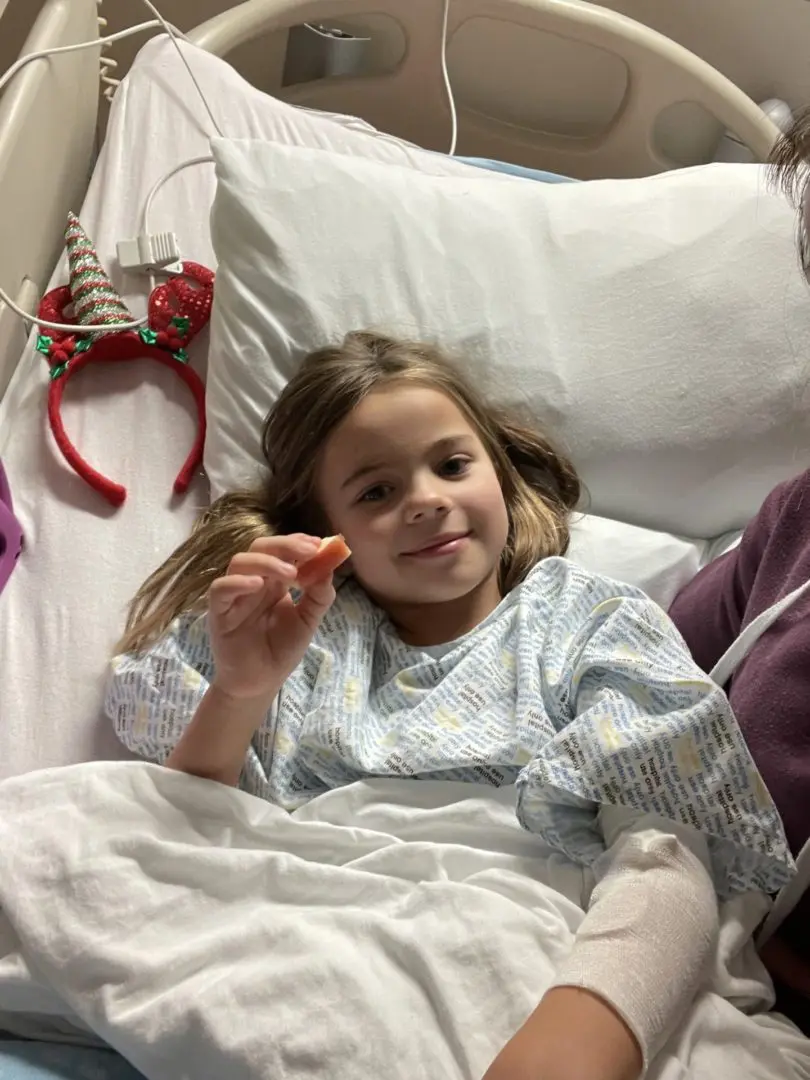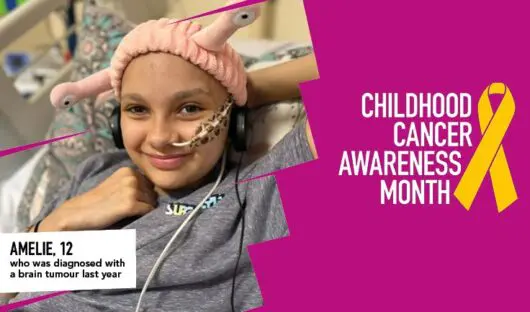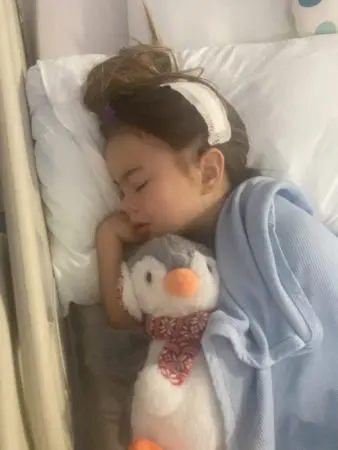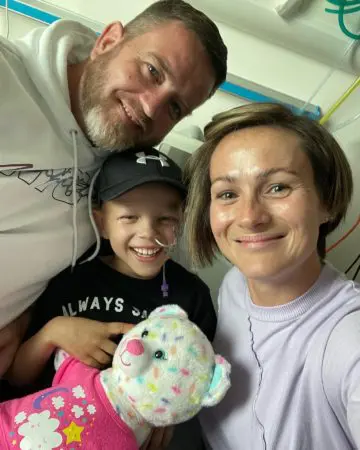Kara’s story
"It was a conversation we never ever thought we’d have to have with our child. We’re still in disbelief that this is happening to our daughter"
During Childhood Cancer Awareness Month, families are sharing the hardest conversations they’ve had during cancer treatment and beyond.

A photo of Kara when she was first admitted to hospital
Kara (7) was having headaches at the front of her head but was well enough to go to school. Her mum Laura took her to the optician as she thought she might need glasses, and a quick eye check showed abnormal swelling at the back of the eyes (optic nerves). Within 24 hours they were admitted to the Royal Hospital for Children in Glasgow, and her parents were told Kara would need an operation to remove a tumour in her brain within days. Here, Kara’s Mum Laura share’s their story:
We sat down with the neuro surgeon on the Wednesday, and Kara had an MRA the following day to give the surgeons a better idea of how they were going to tackle it. Surgery was schedule for the Friday, so it was a very quick turnaround from the tumour being discovered to that happening. During those few days we were trying to figure out how we were going to explain to Kara, who had never had any health issues apart from common colds and chickenpox, that she was going to be put to sleep and have her head cut open?
We spoke with the doctors and the play team, and they said the best thing to do was to be honest with her. We couldn’t not tell her because she’d be so traumatised if we sent her down to theatre and she woke up with a big bandage on her head and a massive scar.
Me and her dad had no idea how to tell her, we didn’t know how to explain it to ourselves let alone explaining it to a seven year old. We started off by calling it a worry. She’d recently read a book at school which was all about a little girl who had a worry in her head, and the more she put off dealing with it, the bigger the worry grew and grew, until eventually she shared the worry with her friend and the worry went away. So we referenced that, and told her she had a small worry in her head that shouldn’t be in there, and that we needed to get it out because it was giving her a sore head. She accepted that, and did understand a bit. She said she didn’t want her head to be cut open, and we told her not to worry that part and brushed over it. We didn’t want to frighten her, we just wanted her to get used to the idea of something being in her head that needed to come out. We wanted to focus on that.
On the Thursday she went for the MRI scan, and she did amazingly well. It all still felt like a bit of an adventure to her. We spoke with Kara and explained that the doctors would be taking the worry out the next morning. She told us she didn’t want her head to be cut open and we explained that she’d be asleep and wouldn’t feel anything or even know it was happening, but she started to get upset so we stopped talking about it and distracted her. We’d bring it up every now and again, in small snippets of what she needed to know at the time. We didn’t want to overwhelm her.
On the Friday morning something had happened and her mind set had totally changed. She woke and said ‘I’m getting my head cut open today aren’t I?’, and I said yes, and she asked if it was the only way they could get it out, and I said it was, and she seemed OK with it. She was fine when we went down to theatre and went off to sleep fine. We weren’t OK of course.
So that conversation wasn’t something we did in one go, we didn’t sit down and explain it all, we did it over a bit of time. We had small conversations so we didn’t overwhelm her in one go. It was a conversation we never ever thought we’d have to have with our child. We’re still in disbelief that this is happening to our daughter.
Donate nowBefore that surgery she looked totally healthy on the outside, she didn’t have the main symptoms that others have. She didn’t have any weakness down one side, or any speech issues. Her headaches were mild. So for us to try and get our heads around the reality of it and stay completely calm when we were having these discussions with Kara was so hard. We never told her the size of the tumour, and we couldn’t be teary when we were talking to her about it. We tried to make our conversations upbeat and positive, and childlike. It was so hard, we were crumbling inside. She had no idea but we were aware of the full implications of what major surgery like this means and the 20% chance her speech or mobility could be effected. But it wasn’t.
We broke it down into small bits for her to digest, we related it to a book she’d read and tried to make it age appropriate. We tried to make it as simple as it could possibly be for her. We didn’t want to traumatise her. Knowing she was comfortable with what was coming made it easier for us to slowly process the information that we also had to deal with. We were emotional wrecks to be honest.
At this point we didn’t have the cancer diagnosis, the tumour had to be sent away for a biopsy. The surgeon did think it would be benign because of the make-up of it, but unfortunately the diagnosis came back different. Kara’s tumour was classed as a grade 3 aggressive anaplastic Ependymoma. This is the highest grade a tumour can be given.
We’ve had other conversations along the way which were hard. She’s got an NG tube fitted now, and that was a difficult one. As well as telling her about the big C and what treatment was going to be. We had to explain treatments that came after the surgery. She’s had months of chemo, and went for proton beam therapy, which was five days a week for seven weeks. And that itself was hard to explain.
For those difficult conversations at the very beginning, she was completely naive to the world of tumours and cancer, we could drip feed her things and she’d accept it, but now, she takes nothing at face value. She will ask and ask and ask. It’s totally changed her way of thinking. She’s trying to understand it all and she’s processing everything. She’ll challenge doctors and nurses if she doesn’t think something is right, she’s developed such a knowledge. She has matured so much since this began under a year ago. We can’t really blag it with her anymore though, it’s really hard to dumb it down for her now. She wants to know the full story with everything.
The difficult conversations don’t go away when you’re having treatment for cancer, it doesn’t get any easy as time goes on. Even with hospital stays, when Kara spikes a temperature she’ll be admitted for a few days, but there was one occasion she ended up being in for ten nights because she ended up with shingles. And we had to tell her every day we had to stay another night and that we weren’t going to get home for the weekend.
Young Lives vs Cancer social worker Leslie-Anne has helped us loads. She first got in contact when we first got the diagnosis. She introduced herself, made us aware of when the charity does, and helped us apply for all the different grants we were entitled to, which I’ve never have known where to start in a million years or that we’d even be entitled to anything because usually it’s means-tested. And wouldn’t have known we could get a blue disability badge. She made it really easy. She also keeps in touch, we’ll meet for a coffee or she’ll call to check in, and if I ever need to talk to someone or need advice I know she’s there. The support we’ve had has been outstanding.
Childhood Cancer Awareness Month
This Childhood Cancer Awareness Month, we're asking you to help us transform the future of cancer care and support for children with cancer.
Find out more about Childhood Cancer Awareness Month
Posted on Thursday 1 September 2022



